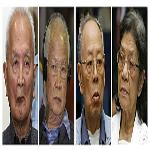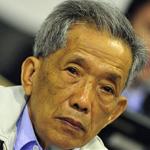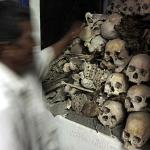June 23, 2011

Photo: AP
Four top surviving leaders of the Khmer Rouge regime from left to right: Nuon Chea, the group's ideologist; former head of state and public face of the regime, Khieu Samphan, former Foreign Minister Ieng Sary; and his wife Ieng Thirith, ex-minister for social affairs (file photo)
On Monday the United Nations-backed tribunal in Phnom Penh will open its hearing into the four surviving leaders of Cambodia's Khmer Rouge movement.
Cambodians have waited three decades for this day: when the surviving leaders of the Khmer Rouge movement appear in court charged with an array of crimes - genocide, war crimes, crimes against humanity, murder. The list is long.
The four defendants are Nuon Chea, also known as Brother Number Two, who is considered the movement's chief ideologue; Khieu Samphan, the head of state; Ieng Sary, the foreign minister and, his wife, Ieng Thirith, the social action minister.
The defendants in this case, the court's second, deny all charges.
That marks a change from Case One, where former security chief Kaing Guek Eav, known as Comrade Duch, admitted his role and pledged to cooperate with the court.

AP
Kaing Guek Eav, also known as Comrade Duch, who ran the notorious Toul Sleng, a top secret detention center for the worst 'enemies' of the state, looks on during his appealing at the U.N.-backed war crimes tribunal in Phnom Penh, Cambodia, March 28, 2011Case One
Duch ran the notorious S-21 security center in Phnom Penh, where at least 14,000 men, women and children were held, tortured, and then executed as enemies of the revolution.
Duch was convicted of war crimes and crimes against humanity and was jailed for 30 years. He has appealed his conviction.
Duch was charged with implementing policy, in his case, that involved torture and executions to unmask so-called strings of traitors whom the regime believed were trying to undermine the revolution. But the four defendants in Case Two are effectively on trial for devising policy, which distances them from atrocities.
Clair Duffy monitors the tribunal on behalf of the Soros-funded Open Society Justice Initiative. She says that difference will likely feature in defense arguments.

AP
A Cambodian man stands in front of human bones and skulls of victims of the Khmer Rouge at a small shrine in Phnom Sampove, Battambang province, 314 kilometers (195 miles) northwest of Phnom Penh (file photo)"When we have seen trials of this scope involving defendants at that level of leadership allegedly, that is the kind of defense that has typically been run - either that they were not present at meetings where these kinds of policies were devised or that they weren't aware of what actually was going to be the result of the policies that were being devised- i.e.: killings, torture, etc," said Duffy.
Complexities
When the court closed Case Two last year, tribunal officials said the case file of 350,000 documents would make this the most complex since the Nuremberg trials of the Nazis.
There are other complexities too. For a start the tribunal has recently been wracked by divisions over its handling of two more cases - known as Cases Three and Four. The Cambodian government has long said it would not permit those last cases to proceed because they could threaten the country's stability.
Investigating judges have been accused of deliberately undermining the cases because of political pressure. Several U.N. staff member recently quit the investigations office in response, and there are fears that the court's handling of Cases Three and Four could damage its legacy.
Another challenge is that all four defendants are elderly, between 79 and 85 years old, and none is in robust health. The trial will likely take several years, and there are fears one or more could die before it ends.
That is what happened in the trial of former Serbian leader Slobodan Milosevic at The Hague, as well as with a number of defendants at the Rwanda tribunal.
OSJI's Duffy says a new rule will allow convictions or acquittals to be delivered against the accused as the trial proceeds. So unless a defendant dies very early on, they would either be convicted or acquitted of certain crimes prior to the trial's conclusion.
"The objective of that is potentially to shorten the trial into smaller bite-size pieces and render judgment progressively on each part rather than have one huge trial involving four accused that potentially goes on for years and judgment is never rendered in relation to one or even all of them," she said.
At 84, Nuon Chea, who was Pol Pot's deputy, is the second-oldest defendant. He has previously blamed Cambodia's age-old enemy Vietnam for much of what went wrong during his government's rule.
Fair trial
One of Nuon Chea's defense lawyers, Michiel Pestman, says he is not optimistic his client will receive a fair trial.
"The signs are on red as far as we are concerned. We are seriously worried that this court is unable to do what they are supposed to do, and that is deliver a fair trial," said Pestman.
Pestman accuses the investigation office, which is meant to be objective in its search for evidence of guilt or innocence, of deliberately favoring information that would convict, rather than acquit, his client.
He says that has undermined Nuon Chea's fair trial rights. "And we have tried to influence this investigation, but all our requests to hear certain witnesses were rejected," said Pestman. "And now we are hoping that the Trial Chamber will hear those witnesses. And we will hear on Monday whether they are willing to do so, but we are afraid that they are not as interested as we think they should be."
Much of the evidence against the four accused has come from a genocide research project in Phnom Penh called the Documentation Center of Cambodia. It provided around half a million documents to the tribunal.
DC-Cam's director is Youk Chhang, and along with millions of Cambodians, he has waited three decades for this day. Youk Chhang says Case Two has the potential to help Cambodians come to terms with their history.
"So I think case two is the most important for me," said Chhang. "I think also for many other survivors as well, because we all know these four guys. As we all know they have no acknowledgments about what happened. They put all the blame to their subordinates, and they blame others. So I think that is important that we have [it]. We want to hear what they have to say."
Whatever the outcome, and regardless of whether any or all of the defendants survive the trial, Monday is highly significant. The surviving leaders of one of the 20th century's most brutal political movements will stand trial for crimes committed in the name of their revolution.